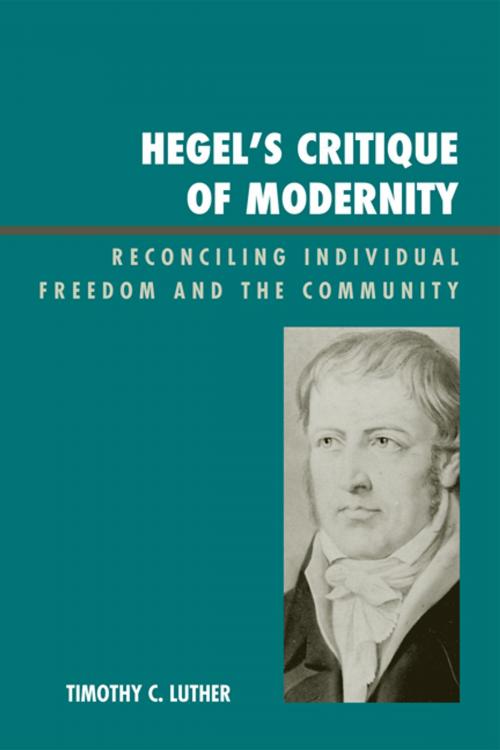Hegel's Critique of Modernity
Reconciling Individual Freedom and the Community
Nonfiction, Religion & Spirituality, Philosophy, Phenomenology, Ethics & Moral Philosophy, Social & Cultural Studies, Political Science| Author: | Timothy C. Luther | ISBN: | 9780739129814 |
| Publisher: | Lexington Books | Publication: | June 16, 2009 |
| Imprint: | Lexington Books | Language: | English |
| Author: | Timothy C. Luther |
| ISBN: | 9780739129814 |
| Publisher: | Lexington Books |
| Publication: | June 16, 2009 |
| Imprint: | Lexington Books |
| Language: | English |
Hegel's enduring importance lies in the fact that his philosophy sheds light on many contemporary problems; his conception of freedom enables us to reconcile many of the differences that divide liberalism and communitarianism. While liberalism tends to overemphasize the individual and devalue the community, communitarianism tends to do the reverse. One of his central aims is to integrate liberalism's concern for the political rights and interests of individuals within the framework of a community. He tries to reconcile the individual and community in a way that creates the proper mix of liberty and authority. One of Hegel's goals is to discover social structures that will allow individuals to escape the alienation that characterizes contemporary life. He sought a method of reconciling his contemporaries to the modern world by overcoming the things that split the self from the social world; that is, a place where people are at home in the social world. A sense of estrangement is all too common, even for those who enjoy more personal freedom and material abundance than ever thought possible. While Hegel is speaking directly to and about his contemporaries, their social world bears much in common with ours. Consequently, his attempt to reconcile philosophical and social contradictions can elucidate our own condition. While the modern world reflects important contributions, the advent of modern liberalism leads to excessive individualism that fragments social life, leaving individuals disconnected and adrift from meaningful social life. The major goal of Hegel's political philosophy is to reconcile the individual with his or her political community in a way that overcomes the alienation of modern life.
Hegel's enduring importance lies in the fact that his philosophy sheds light on many contemporary problems; his conception of freedom enables us to reconcile many of the differences that divide liberalism and communitarianism. While liberalism tends to overemphasize the individual and devalue the community, communitarianism tends to do the reverse. One of his central aims is to integrate liberalism's concern for the political rights and interests of individuals within the framework of a community. He tries to reconcile the individual and community in a way that creates the proper mix of liberty and authority. One of Hegel's goals is to discover social structures that will allow individuals to escape the alienation that characterizes contemporary life. He sought a method of reconciling his contemporaries to the modern world by overcoming the things that split the self from the social world; that is, a place where people are at home in the social world. A sense of estrangement is all too common, even for those who enjoy more personal freedom and material abundance than ever thought possible. While Hegel is speaking directly to and about his contemporaries, their social world bears much in common with ours. Consequently, his attempt to reconcile philosophical and social contradictions can elucidate our own condition. While the modern world reflects important contributions, the advent of modern liberalism leads to excessive individualism that fragments social life, leaving individuals disconnected and adrift from meaningful social life. The major goal of Hegel's political philosophy is to reconcile the individual with his or her political community in a way that overcomes the alienation of modern life.















